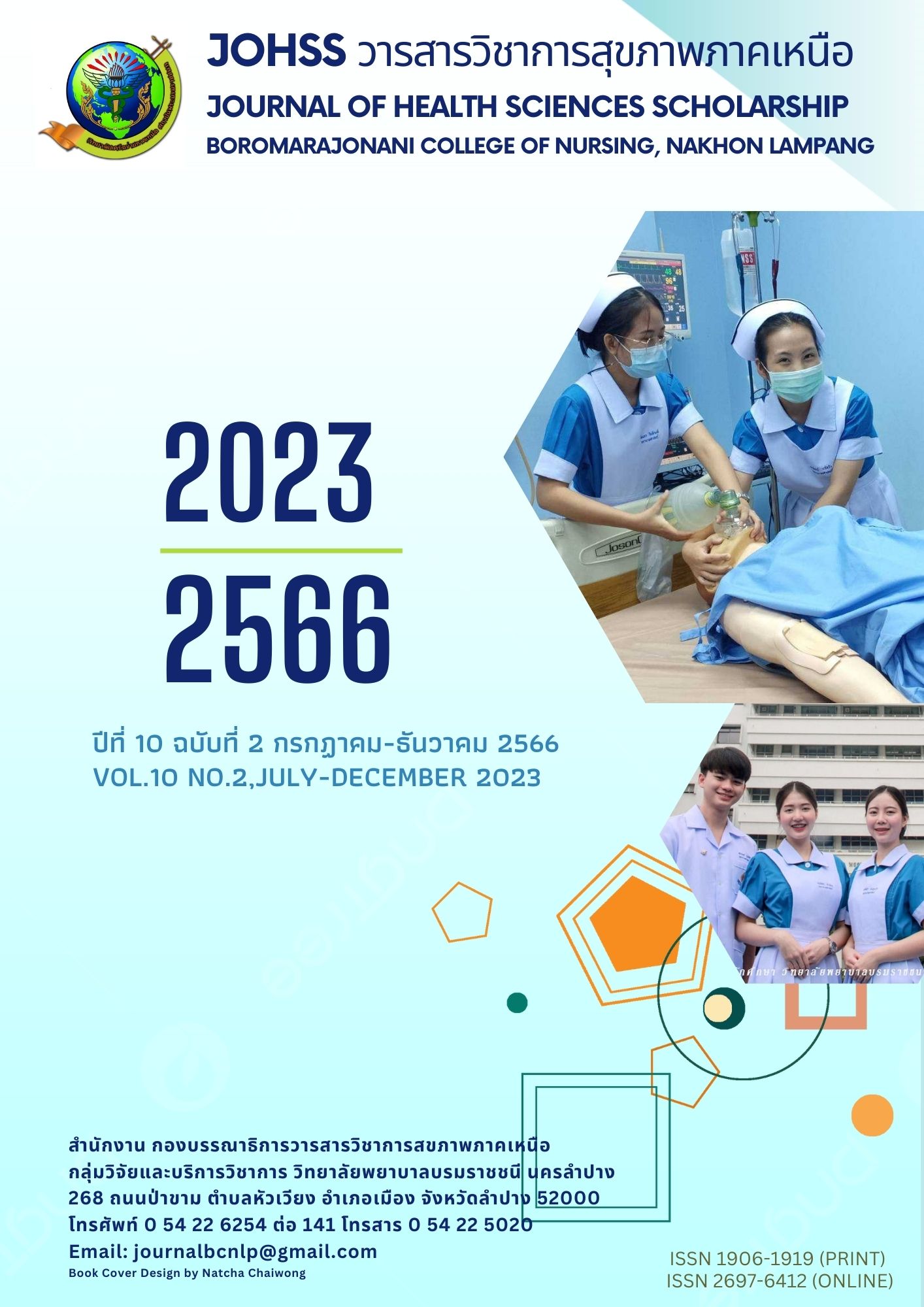ผลของการสอนสุขศึกษาแบบการใช้แอพพลิเคชั่นไลน์ และส่งเสริมการจัดการตนเองต่อระดับนํ้าตาลในเลือด (2hrPP), นํ้าหนักที่เพิ่มขึ้นอย่างเหมาะสม และผลลัพธ์ของการตั้งครรภ์ในสตรีที่เป็นเบาหวานขณะตั้งครรภ์ โรงพยาบาลลำปาง
บทคัดย่อ
การวิจัยกึ่งทดลองนี้มีวัตถุประสงค์เพื่อเปรียบเทียบค่าเฉลี่ยระดับน้ำตาลในเลือดหลังรับประทานอาหาร 2 ชั่วโมง (2hrPP), น้ำหนักที่เหมาะสมและผลลัพธ์ของการตั้งครรภ์ในสตรีที่เป็นเบาหวานขณะตั้งครรภ์ระหว่างกลุ่มที่ได้รับการสอนสุขศึกษาแบบการใช้แอพพลิเคชั่นไลน์และส่งเสริมการจัดการตนเองกับกลุ่มที่ได้รับการดูแลตามมาตรฐาน ณ ห้องฝากครรภ์และห้องคลอด โรงพยาบาลลำปาง กลุ่มตัวอย่าง คือ สตรีตั้งครรภ์ที่มาฝากครรภ์โรงพยาบาลลำปางและได้รับการวินิจฉัยเบาหวานขณะตั้งครรภ์ 90 ราย แบ่งเป็นกลุ่มควบคุมและกลุ่มทดลองกลุ่มละ 45 ราย เครื่องมือที่ใช้ในการวิจัยประกอบด้วย แบบสอบถามข้อมูลส่วนบุคคลและข้อมูลทางสูติศาสตร์, แบบบันทึกระดับน้ำตาลในเลือด (2hrPP), แบบบันทึกน้ำหนักที่เพิ่มขึ้น, แบบบันทึกผลลัพธ์ของการตั้งครรภ์ วิเคราะห์ข้อมูลด้วยสถิติ Independent t-test และ Fisher exact test
ผลการศึกษา พบว่าสตรีที่เป็นเบาหวานขณะตั้งครรภ์ในกลุ่มทดลอง มีค่าเฉลี่ยน้ำหนักที่เพิ่มขึ้นต่ำกว่ากลุ่มควบคุมอย่างมีนัยสำคัญทางสถิติ โดยค่าเฉลี่ยน้ำหนักที่เพิ่มขึ้นของกลุ่มทดลองและกลุ่มควบคุมเท่ากับ 8.7 ± 4.8 กก. และ 11.2 ± 6.7 กก.ตามลำดับ (p=0.004) และพบว่ากลุ่มทดลองมีน้ำหนักที่เพิ่มขึ้นอย่างเหมาะสมร้อยละ 71.1 ส่วนกลุ่มควบคุมมีน้ำหนักที่เพิ่มขึ้นอย่างเหมาะสมเพียงร้อยละ 40.0 (p= .006) ส่วนค่าเฉลี่ยระดับน้ำตาลในเลือด 2hrPP และผลลัพธ์ของการตั้งครรภ์ไม่แตกต่างกัน
การศึกษาครั้งนี้สิ่งที่ดำเนินการหลักคือการให้สุขศึกษาเพื่อส่งเสริมการจัดการตนเองในสตรีที่เป็นเบาหวานขณะตั้งครรภ์ให้สามารถควบคุมน้ำหนักที่เพิ่มขึ้นอย่างเหมาะสมได้ จึงควรนำไปปรับใช้ในโรงพยาบาลที่มีระดับการบริการขนาดเดียวกัน
เอกสารอ้างอิง
Cohen, J. (1988). Statistical Power Analysis for the Behavioral Sciences (2nd Eds.). Hillsdale, NJ: Lawrence Erlbaum Associates, Publishers.
Cunningham, F.G., (2014). Williams Obstetrics. 24th edition McGraw-Hill Education. Diabetes Mellitus: Medical.
Department of Obstetrics and Gynecology, Faculty of Medicine Chiang Mai University. (2016). Gestational Diabetes Mellitus in Chiang Mai University. (in Thai).
Deputy, N.P., Sharma, A.J., & Kim, S.Y. (2015). Gestational Weight Gain – United States, 2012 and 2013. MMWR Morbidity and mortality weekly report. 64(43) :1215-1220.
Division of Medical Record Siriraj Hospital, Faculty of Medicine Siriraj Hospital, Mahidol University. (2018). Statistical report Siriraj Hospital. (in Thai).
Kanfer, F. H., & Gaelick-Buys, L. (1991). Self-management methods. In F. H. Kanfer & A. P. Goldstein (Eds.), Helping people change: A textbook of methods (305–360). Pergamon Press.
Lee, K.W. et al. (2018). Prevalence and risk factors of gestational diabetes mellitus in Asia: a systematic review and meta-analysis. BMC Pregnancy Childbirth, 18(1), 481- 494.
Limruangrong, (2016). The Self-regulation in pregnant women with gestational diabetes mellitus. Retrieved 1 November 2023 from https://shorturl.asia/sioyR.
Obstetrics and Gynecology Group Lampang Hospital. (2022). Incidence of diabetes in pregnant women 2017 – 2022 in Lampang Hospital. Lampang Hospital. (in Thai).
Researcher Thailand. (2020). Meaning of T - Test Dependent and T - Test Independent. Retrieved 1 November 2023. https://shorturl.asia/OMWxY.
Sitkulanan, P., & Kumtip, P. (2020). Impact of a Self-Management Program Monitored through the Application LINE on Eating Bchaviour, Arm-Swing Exercise Behaviour, and Blood Glucose Levels in Women with Gestational Diabetes Mellitus. Journal of the Nursing and Midwifery Council, 35(2), 52-69. (in Thai).
Suwannarat, K., Tachasuksri, T., & Siriarunrat, S. (2019). Effects of a self-management support program on diabetes self-management behavior and blood sugar level in women with gestational diabetes mellitus. Journal of Phrapokklao Nursing College, 30(2), 1- 13.
Sirirat, S., Boriboonhirunsarn, D., Ruangvutilert, P., & Yapan, P. (2022). Prevalence of Gestational Diabetes Mellitus among Women with Lower Risk for Gestational Diabetes in Siriraj Hospital. Thai Journal of Obstetrics and Gynaecology, 30(5), 313-320.
Tong Wei Yew & et.al. (2021). A Randomized Controlled Trial to Evaluate the Effects of a Smartphone Application–Based Lifestyle Coaching Program on Gestational Weight Gain, Glycemic Control, and Maternal and Neonatal Outcomes in Women with Gestational Diabetes Mellitus: The SMART-GDM Study. Diabetes Care, 44, 456–463.
Zandinava, H., Shafaei, F. S., Charandabi, S. A., Homayi, S. G., & Mirghafourvand, M. (2017). Effect of educational package on Self-Care behavior, quality of life, and blood glucose levels in regnant women with gestational diabetes: A randomized controlled trial. Iranian Red Crescent Medical Journal, 19(4), 1-9.
ดาวน์โหลด
เผยแพร่แล้ว
ฉบับ
ประเภทบทความ
สัญญาอนุญาต
ลิขสิทธิ์ (c) 2023 วิทยาลัยพยาบาลบรมราชชนนี นครลำปาง

อนุญาตภายใต้เงื่อนไข Creative Commons Attribution-NonCommercial-NoDerivatives 4.0 International License.
บทความ ข้อมูล เนื้อหา รูปภาพ ฯลฯ ที่ได้รับการตีพิมพ์ในวารสารวารสารวิชาการสุขภาพภาคเหนือ ถือเป็นลิขสิทธิ์ของวารสารวารสารวิชาการสุขภาพภาคเหนือ หากบุคคลหรือหน่วยงานใดต้องการนำทั้งหมดหรือส่วนหนึ่งส่วนใดไปเผยแพร่ต่อหรือเพื่อกระทำการใดๆ จะต้องได้รับอนุญาตเป็นลายลักอักษรจากวารสารวารสารวิชาการสุขภาพภาคเหนือก่อนเท่านั้น
เนื้อหาและข้อมูลในบทความที่ลงตีพิมพ์ในวารสารวิชาการสุขภาพภาคเหนือถือเป็นข้อคิดเห็นและความรับผิดชอบของผู้เขียนบทความโดยตรงซึ่งกองบรรณาธิการวารสาร ไม่จำเป็นต้องเห็นด้วย หรือร่วมรับผิดชอบใดๆ
อนึ่ง ข้อความและข้อคิดเห็นต่างๆ เป็นของผู้เขียนบทความนั้นๆ ไม่ถือเป็นความเห็นของวารสารฯ และวารสารฯ ไม่จำเป็นต้องเห็นด้วยกับข้อความและข้อคิดเห็นใดๆ ของผู้เขียน วารสารฯ ขอสงวนสิทธิ์ในการพิจารณาตีพิมพ์ตามความเหมาะสม รวมทั้งการตรวจทานแก้ไขหรือขัดเกลาภาษาให้ถูกต้องตามเกณฑ์ที่กำหนด



